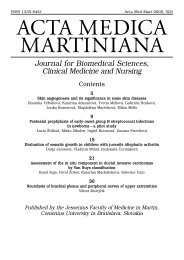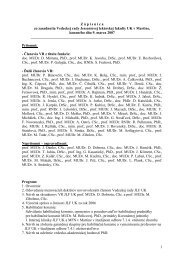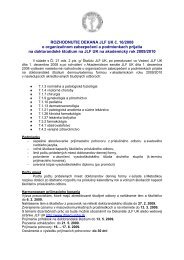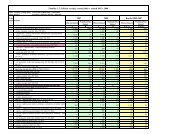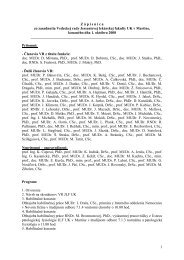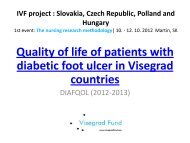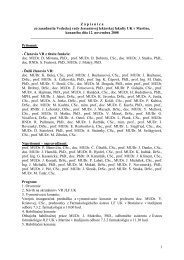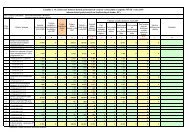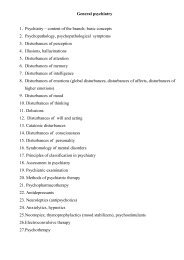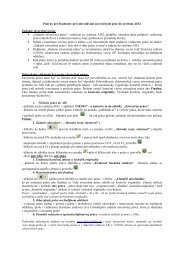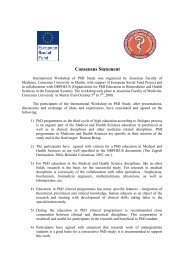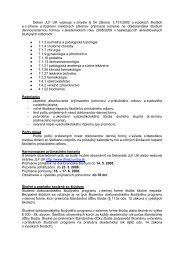health services
health services
health services
You also want an ePaper? Increase the reach of your titles
YUMPU automatically turns print PDFs into web optimized ePapers that Google loves.
HEALTH SERVICES (by Mgr. GABRIELA PROKŠOVÁ)<br />
- include all <strong>services</strong> dealing with the diagnosis and treatment of disease, or the<br />
promotion, maintenance and restoration of <strong>health</strong>.<br />
When talking about the nature of <strong>health</strong> care, we can say that - combining medical<br />
technology and the human touch - it diagnoses, treats, and administers care around the clock<br />
(- which means for 24 hours) - from newborns to the terminally ill.<br />
Health <strong>services</strong> are the most visible functions of any <strong>health</strong> care system, both to users and<br />
the general public. A basic principle in Slovakia is that <strong>health</strong> should be the fundamental right<br />
of everyone. All citizens are entitled to receive <strong>health</strong> care. This is also regarded as public<br />
interest of the state. Everyone in need has to receive medical treatment. Everyone has to be<br />
treated with the same dignity, regardless of his social position.<br />
Talking about <strong>health</strong> <strong>services</strong>, more aspects can be taken into consideration: we can talk<br />
about <strong>health</strong> care system as a whole, about primary <strong>health</strong> care, about <strong>health</strong> workforce, <strong>health</strong><br />
care statistics, <strong>health</strong> insurance, recent developments, etc.<br />
HEALTH CARE SYSTEM<br />
The <strong>health</strong> care system as a whole is made up by many <strong>health</strong> care establishments; they<br />
vary greatly in terms of size and organizational structures, ranging from small-town private<br />
practices of physicians, dentists, or other <strong>health</strong> practitioners who employ only one nurse or<br />
medical assistant to busy inner-city hospitals that employ most of all <strong>health</strong> care workers.<br />
In general, the <strong>health</strong>care system consists of the following segments:<br />
1) AMBULATORY HEALTHCARE SERVICES / OUT-PATIENT HEALTH CARE<br />
- represented by surgeries (offices) of general practitioners, offices of medical specialists,<br />
offfices of other <strong>health</strong> practitioners, offices of dentists, home <strong>health</strong> care <strong>services</strong>,<br />
other ambulatory <strong>health</strong>care <strong>services</strong>, which may include medical and diagnostic<br />
laboratories and special out-patient care centres.<br />
2) HOSPITALS / IN-PATIENT HEALTH CARE<br />
- represented by general hospitals, other specialty hospitals, psychiatric and substance<br />
abuse hospitals.<br />
3) RESIDENTIAL AND NURSING CARE FACILITIES<br />
- represented by nursing care facilities, community care facilities for the elderly, residential<br />
mental <strong>health</strong> facilities and other residential care facilities.<br />
1) AMBULATORY HEALTHCARE SERVICES:<br />
- provide <strong>services</strong> for ambulatory patients, called also out-patients, who only come for<br />
treatment but do not stay in. The providers of ambulatory <strong>health</strong> care <strong>services</strong> often work in<br />
polyclinics or <strong>health</strong> care centres established during the former regime. These <strong>services</strong>,<br />
formerly operated by the state, are now separate from the public <strong>health</strong> sector and reimbursed<br />
through a compulsory insurance programme. The quality of the <strong>services</strong> provided in these<br />
centres range from superior to poor.<br />
Nowadays, some physicians and surgeons are increasingly working as employees of group<br />
medical practices or clinics. These modern and well-equipped medical practices or clinics<br />
usually do not employ only highly-qualified medical and nursing staff, but also receptionists,<br />
information clerks, etc.
Offices (surgeries) of general practitioners<br />
A considerable percentage of all <strong>health</strong> care establishments are the surgeries (offices) of<br />
general practitioners. General practitioners (-comparable to family doctors in Great Britain)<br />
are responsible for the primary care and refer the patient to the specialist, if necessary.<br />
Nowadays, most of them practice privately as self-employed subjects, giving employment<br />
for one registered nurse. They are bound by contract to the <strong>health</strong> insurance companies, and<br />
paid with a per capita premium per patient. This is the main part of their payment, but can be<br />
increased by some additional fees for special treatments. The patient does not pay for <strong>health</strong><br />
care provided.<br />
The densitity of general practitioners in Slovakia is relatively high.<br />
Offices (practices) of medical specialists<br />
These <strong>services</strong> include the offices of medical specialists – gynaecologists, haematologists,<br />
surgeons, urologists, etc. They usually work in polyclinics or <strong>health</strong> centres or in hospital outpatients´<br />
offices. Similar to the general practitioners, most of them are self-employed, bound<br />
by contract to the <strong>health</strong> insurance companies, giving employment for one registered nurse.<br />
They are paid with a per capita premium per patient as well as for the special treatments<br />
performed.<br />
The patient is usually referred to the specialist by his general practitioner, but this referral<br />
has not been needed recently, and the patient can directly go and see the specialist. In case of<br />
a visit to the gynaecologist this has been a rule for a long time.<br />
There are also medical specialists who still work for hospitals, but have opened also<br />
private practices of their own. These practices are usually well equipped and often operate in<br />
the afternoon or in the evening, sometimes even during weekends. Patients are examined by<br />
appointment and the waiting time for the examination is usually short. Especially in these<br />
offices, the <strong>health</strong> insurance does not cover the costs and the patient has to pay some extra fee.<br />
To tell the truth, the quality of these facilities differs, too. While the <strong>services</strong> offered in<br />
some of these centers are only slightly more improved than in regular medical institutions<br />
operated by the state, other facilities are luxurious and very well equipped.<br />
Offices of other <strong>health</strong> practitioners<br />
These <strong>services</strong> include the offices of psychologists, speech therapists, audiologists,<br />
dietitians, chiropractors, optometrists, podiatrists, occupational and physical therapists, etc.<br />
Also the offices of practitioners of alternative medicine, such as homeopaths,<br />
acupuncturists, hypnotherapists, and naturopaths, can be included among them.<br />
Demand for this <strong>services</strong> is often related to the ability of patients to pay, as only some of<br />
them are paid through <strong>health</strong> insurance.<br />
Offices of dentists / out-patient dental treatment<br />
Dentists' offices provide preventative and emergency care, sometimes also cosmetic care.<br />
The basic stomatologic care is free of charge, but its extent is not very wide. For all the other<br />
stomatologic <strong>services</strong> provided by the dentist, participation of the patient on expenses or full<br />
direct payment are needed.<br />
The typical staffing pattern in dentists' offices in Slovakia consists of one dentist working<br />
with a support of a nurse or a dental assistant. Larger practices are more likely to employ<br />
dental hygienists, dental assistants or administrative staff, but especially in them the dentists<br />
are not bound by contract to the <strong>health</strong> insurance companies and all the fees have to be paid<br />
by the patient.<br />
The <strong>services</strong> in some high-quality dental offices are very expensive, but they usually are<br />
worth the money. Some offices specialize in a single field of dentistry, such as orthodontics.<br />
Home <strong>health</strong> care <strong>services</strong><br />
In Slovakia, <strong>health</strong> care <strong>services</strong> in the home are provided mainly to the elderly, but are in<br />
most cases related only to nursing care. Skilled nursing care is provided by registered nurses,
y nursing aides or home care aides under supervision of a highly educated nurse, usually<br />
running a home care agency of her own.<br />
Based on the present-day shortage of financial sources, there is an assumption that these<br />
<strong>services</strong> will develop fast as they can substantially save <strong>health</strong> care costs. The patients'<br />
preference for care in the home constitutes another advantage, but the existing lack of inhome<br />
medical technologies may slow down this inevitable progress.<br />
Other ambulatory <strong>health</strong>care <strong>services</strong><br />
These <strong>services</strong> are not so numerous as the above mentioned. They include medical and<br />
diagnostic laboratories as well as some special outpatient care centres. These establishments<br />
are diverse, ranging from medical laboratories that analyze blood, do diagnostic imaging, and<br />
perform other clinical tests, to blood and organ banks, outpatient mental <strong>health</strong> centres, and<br />
substance abuse centres.<br />
2) HOSPITALS:<br />
- provide <strong>services</strong> for hospitalized patients, called also in-patients, who have to stay in for<br />
some period of time.<br />
Hospitals provide complete medical care, ranging from diagnostic <strong>services</strong>, to surgery, to<br />
continuous nursing care. Some hospitals specialize in treatment of the mentally ill, cancer<br />
patients, or children.<br />
The quality varies depending on the type of hospital. The best medical facilities are the<br />
teaching hospitals in Bratislava, Martin and Košice that are attached to medical faculties.<br />
They are sufficiently equipped and the medical staff is highly professional.<br />
Hospitals in Slovakia mostly provide <strong>health</strong> care based on an inpatient (overnight) basis.<br />
But nowaday, as they need to improve their efficiency, care slowly continues to shift from an<br />
inpatient to outpatient basis whenever possible.<br />
Every point in the process of care-giving contains a certain degree of inherent unsafety but<br />
patient´s safety is a fundamental principle of <strong>health</strong> care. Therefore, making hospitals and<br />
<strong>health</strong> facilities safe from disasters is not only an economic, but also a social, moral and<br />
ethical necessity.<br />
Emergency operates in every hospital for 24 hours 7 days a week. Emergency phone<br />
numbers are 155 and 112.<br />
Hospitals employ workers with all levels of education and training, ranging from medical<br />
staff of various specialties to special therapists, social workers, registered nurses, nursing<br />
aides, psychiatric aides, or building cleaning workers. Hospitals also employ office and<br />
administrative workers.<br />
3) RESIDENTIAL AND NURSING CARE FACILITIES:<br />
Residential care facilities provide around-the-clock social and personal care to children,<br />
the elderly, and others who have limited ability to care for themselves. Workers care for<br />
residents of alcohol and drug rehabilitation centers or not very numerous assisted-living<br />
facilities. Nursing and medical care, however, are not the main functions of establishments<br />
providing residential care.<br />
Nursing care facilities provide inpatient nursing, rehabilitation, and <strong>health</strong>-related personal<br />
care to those who need continuous nursing care, but do not require hospital <strong>services</strong>. Patients<br />
who need less assistance can be cared for in convalescent homes.<br />
PRIMARY HEALTH CARE<br />
The ultimate goal of primary <strong>health</strong> care is better <strong>health</strong> for all.
Primary <strong>health</strong> care plays a central role in <strong>health</strong> care systems worldwide. It provides<br />
immediate and often continuing care for children, adults, or families. These <strong>services</strong> are<br />
located in communities, making them the first point of contact with the <strong>health</strong> system. They<br />
are coordinated with higher levels of the <strong>health</strong> system that can provide more specialized care<br />
when needed. Patients are followed over time by the same primary care providers.<br />
These <strong>services</strong> typically include childhood immunizations, treatment of common<br />
childhood illnesses, maternity care, and prevention and treatment of some other common<br />
adulthood illnesses.<br />
Most primary <strong>health</strong> care interventions are highly cost-effective.<br />
HEALTH WORKFORCE<br />
It is important to realize that even if we in Slovakia usually do not speak about <strong>health</strong>care<br />
as about an industry, it really is an important and large industry providing thousands of jobs.<br />
In the future, <strong>health</strong>care is even expected to generate more jobs than any other industry,<br />
largely in response to rapid growth in the elderly population.<br />
WORKING CONDITIONS<br />
By the present Labour Code, the Slovak <strong>health</strong>care workers are allowed to work<br />
a maximum of 40 hours per week, possibly 48 hours per week by mutual consent. Nowadays,<br />
the Ministry of Heath is considering an increase in the number of working hours up to 56,<br />
which could mean prolonging the working hours from the current 8-9 up to 11-12 a day.<br />
In some foreign countries, many <strong>health</strong> care workers are on part-time schedules. In Slovakia,<br />
the part-time workers unfortunatelly make up the lowest percentage of all the <strong>health</strong> care<br />
workforce within the European Union.<br />
WORKING ENVIRONMENT<br />
All workers in <strong>health</strong> care are experiencing increasing stress. Home care personnel and<br />
other <strong>health</strong> care workers who travel as part of their job are exposed to the possibility of being<br />
injured in car accidents. Moreover, <strong>health</strong> care workers involved in direct patient care must<br />
take precautions to prevent back strain from lifting patients and equipment; to minimize<br />
exposure to radiation and caustic chemicals; and to guard against infectious diseases.<br />
TRAINING FOR HEALTH CARE OCCUPATIONS<br />
In Slovakia, a variety of secondary, post-secondary, or university bachelor, master and<br />
doctoral programmes provide specialized training for jobs in <strong>health</strong> care.<br />
Persons considering careers in <strong>health</strong>care should have a strong desire to help others,<br />
genuine concern for the welfare of patients and clients, and an ability to deal with people of<br />
diverse backgrounds in stressful situations.<br />
OCCUPATIONS<br />
Healthcare establishments employ large numbers of workers.<br />
Professional occupations represented by highly educated staff, such as medical doctors or<br />
dentists require a doctoral degree. In registered nurses, midwives, physiotherapists, radiology<br />
technicians, dental hygienists, social workers, etc., at least a bachelor degree is required but<br />
recently, many of them have taken either full-time or part-time courses and have attained a<br />
master degree. Professional workers often have high levels of responsibility. In addition to<br />
providing <strong>services</strong>, they may supervise other workers or conduct research.<br />
Service occupations represented by auxiliary or support staff, such as nursing aides, medical<br />
assistants, home care aides, cleaning workers, usually do not require any special education but<br />
progressively with experience and training, further education may be needed.<br />
Office, management and administrative jobs account for the rest of employment.
JOBS PROSPECTS<br />
Healthcare workers at all levels of education and training will continue to be in demand. In<br />
many cases, it may be easier for jobseekers with <strong>health</strong>-specific training to obtain jobs.<br />
Health care is expected to generate a lot of new jobs in the future, largely in response to<br />
rapid growth in the elderly population. All of us know that the older persons have a higher<br />
incidence of injury and illness and often take longer to heal. As a result, demand for <strong>health</strong><br />
care will increase, especially in facilities specializing in care for the elderly, as life<br />
expectancies rise, and families are less able to care for their elder family members.<br />
Advances in medical technology will continue to improve the survival rate of severely ill<br />
and injured patients, who will then need extensive therapy and care.<br />
New techologies will continue to enable earlier diagnoses of many diseases which often<br />
increases the ability to treat conditions that were previously not treatable.<br />
Demand for <strong>health</strong>care will also grow as a result of the shift from inpatient to less<br />
expensive outpatient and home <strong>health</strong> care. Hospitals will be the slowest growing segment<br />
within the <strong>health</strong> care because of efforts to control hospital costs.<br />
HEALTH CARE IN SLOVAKIA IN FIGURES<br />
EARNINGS<br />
Average earnings of <strong>health</strong>care workers in Slovakia were lower than the national average<br />
last year, with hospital workers earning considerably more than the average and those<br />
employed in residential and nursing care facilities and home <strong>health</strong> care <strong>services</strong> earning less.<br />
Average earnings often are higher in hospitals because of a higher percentage of jobs<br />
requiring higher levels of education and training. The average annual earnings in 2010 were<br />
769 Euro, those of <strong>health</strong> care and social workers were 698 Euro.<br />
Earnings vary not only by type of establishment and occupation, but also by size; salaries<br />
tend to be higher in larger hospitals. Health care establishments that must be staffed around<br />
the clock to care for patients and handle emergencies often pay premiums for late shifts,<br />
overtime and weekend work, national holidays, and time spent on call. Geographic location<br />
also can affect earnings.<br />
DENSITY OF DOCTORS PER 100,000 INHABITANTS:<br />
Slovakia has approx. 5.4 million inhabitants. There is no correct and unambiguous<br />
answer to the question how many medical doctors are actually needed per 100,000<br />
inhabitants. This number is said not to relate in any special way to the country´s wealth or to<br />
the average length of life in the country´s population. It is interesting to know that there are<br />
more than 500 medical doctors per 100,000 inhabitants in Cuba, 400 in Denmark, but only<br />
about 200 in Britain. The average in Slovakia is said to be not too much above 300 per<br />
100,000 inhabitants (317 in 2006).<br />
Overall there are some 18,000 – 19,500 medical and dental doctors in Slovakia (7,000 –<br />
8,000 of them in hospitals). This total has not dramatically changed in the last decades but the<br />
age structure has. Year by year there are more elderly doctors and fewer young doctors aged<br />
under 30 years. More than 40% of medical staff count among the age group of 50 – 60 years<br />
old. Even if about 600 students graduate from medical faculties every year, about a half of<br />
them leave the country with a vision of better earnings abroad.<br />
Slovakia used to have a rather high ratio of nurses per population among the East European<br />
countries but this has changed dramatically. The following piece of information may sound<br />
out-of-date, but can illustrate the reality: there were 6.3 nurses per 1,000 people in the years<br />
2000-2004, with the highest negative growth rate among all the counties investigated: -3.9 per<br />
1,000 people. To compare this to the Czech Republic: the ratio of nurses in the Czech
Republic represents 8.00 per 1,000 people, 9.6 is an average within OECD countries. There is<br />
also another issue: the median age of registered nurses is increasing, and not enough younger<br />
workers are replacing them.<br />
RESEARCH BY THE LEGATUM INSTITUTE<br />
It is very interesting to learn that according to a worldwide research performed by the<br />
Legatum Institute in 2010 among 110 countries, Slovakia took 37 th place among them, but<br />
<strong>health</strong> expenditure per capita of roughly $1,250 (in 2008) placed Slovakia 29th<br />
internationally, and it has the 15th highest availability of hospital beds.<br />
According to this research, Slovakia performs well with respect to most basic <strong>health</strong><br />
measures. The infant mortality is low as Slovakia has very good rates of immunisation against<br />
infectious diseases and measles, indicating strengths with respect to preventative <strong>health</strong>care.<br />
(Based on another source, in1997, immunization rates for children up to one year old were<br />
impressively high: tuberculosis, 90%; diphtheria, pertussis, and tetanus, 98%; polio, 98%; and<br />
measles, 98%.)<br />
All citizens have access to adequate sanitation facilities and four out of five people are<br />
satisfied with the water quality where they live. These facts are reflected in a below average<br />
death rate from respiratory diseases and low prevalence of tuberculosis infections.<br />
However, subjective variables paint another picture. Satisfaction with overall personal<br />
<strong>health</strong> was low in 2006, placing the country 85th, in the Index. One-quarter of people<br />
complained that <strong>health</strong> problems prevented them from leading a normal life.<br />
This negative rating can result from present-day expectations. Slovak citizens now expect<br />
a higher standard of <strong>health</strong> care, i.e. complex <strong>services</strong> that are both available and available<br />
outside regular working hours with no long lines in the waiting rooms. A second question that<br />
needs to be addressed concerns the costs of these <strong>services</strong> and who it is who will actually pay<br />
for them.<br />
Citing from another source, public expenses for <strong>health</strong> <strong>services</strong> amounted to 7.2% of the<br />
GDP which only means 565 USD per capita (Zubrický, 2009), representing half the amount<br />
by the Legatum Institute.<br />
Some more facts: the life expectancy in Slovakia is 70 years for men and 78 years for<br />
women which means 3 years less in both genders than the average within the EU. In 2010, the<br />
crude birth rate was estimated at 10.55 per 1,000 people, overall mortality rate was estimated<br />
at 9.56 per 1,000 people.<br />
HEALTH INSURANCE<br />
Health care in Slovakia is financed by the <strong>health</strong> insurance system in which contributions<br />
are shared between employers and employees. The insurance fee is deducted from the wages.<br />
Health insurance in Slovakia is obligatory and shall be paid by every citizen. The state<br />
contributes for the inactive poulation, e.g. for children, the disabled and women on maternity<br />
leave.<br />
Accordingly everyone has in principle the right for <strong>health</strong> care provision, for drugs and for<br />
medical devices free of charge. But in some cases (dentistry, drugs), the participation of<br />
patient on expenses on <strong>health</strong> care has been assigned by law, and there are certain fees for the<br />
<strong>services</strong> regarding the <strong>health</strong> care provision.<br />
Slovakia has several <strong>health</strong> insurance companies. Just a few years ago, there were seven<br />
<strong>health</strong> insurance companies operating nationwide, but four of them have fused with the<br />
stronger ones.<br />
Nowadays, there are three <strong>health</strong> insurance companies operating throughout Slovakia:<br />
GENERAL HEALTH INSURANCE COMPANY, INC.
(Všeobecná zdravotná poisťovňa, a.s.) (-covers maybe two-thirds of the population)<br />
HEALTH INSURANCE COMPANY DÔVERA, INC.<br />
(Zdravotná poisťovňa Dôvera, a.s.)<br />
UNION HEALTH INSURANCE COMPANY, INC.<br />
(Union zdravotná poisťovňa, a.s.)<br />
Public and private <strong>health</strong> care providers generally conclude the contracts with the <strong>health</strong><br />
insurance companies. But not all of them. The <strong>health</strong> insurance companies reimburse the<br />
<strong>health</strong> care provided just by the <strong>health</strong> care providers who had concluded the contract with<br />
them. Pay in cash is requested in the case of treatment by the non-contract physician.<br />
Everyone has the right to choose the <strong>health</strong> insurance company, e.g. individuals can freely<br />
enrol with any of the insurance companies. If you are a client of a <strong>health</strong> insurance company,<br />
it will cover the treatment provided in all state medical facilities. In case you do not have such<br />
insurance, you will have to pay for the treatment yourself.<br />
Operations and hospital treatments in Slovakia are covered from the <strong>health</strong> insurance,<br />
but some special medical treatments such as plastic surgery or sterilization are paid by<br />
patients themselves.<br />
Although a part of the fee for treatment provided in a private <strong>health</strong> facility will be covered<br />
too, the doctor may still ask the patient for additional payment for treatment, or service, not<br />
covered by <strong>health</strong> insurance, e.g. medical treatments for administrative purposes. Price lists<br />
can are available in every <strong>health</strong> care establishment.<br />
Dental treatment in Slovakia is usually not fully covered by <strong>health</strong> insurance and many<br />
dentists in Slovakia do not have contracts with <strong>health</strong> insurance companies. In this case,<br />
patient covers the full treatment himself.<br />
Emergency service is free of charge in most cases, but in the other cases, patient is obliged<br />
to cover a co-payment. In case of a mountain accident, the individual has to finance all the<br />
rescue as well as medical service unless they have not taken out mountain insurance.<br />
Ambulance transport to and from hospital or for some special tretments is paid by the<br />
patient, depending on the distance. If emergency (life-saving) <strong>health</strong> service transport is<br />
requested, there is no fee.<br />
Most medications are partially covered by the insurance; some medications are even fully<br />
covered while others are only available on full payment. Antibiotics and many other pills are<br />
only available on doctoral prescription.<br />
SOME MORE POINTS TO CONSIDER<br />
TECHNOLOGICAL ADVANCES<br />
In the rapidly changing <strong>health</strong> care system, technological advances have made many new<br />
procedures and methods of diagnosis and treatment possible. Clinical developments, such as<br />
infection control, less invasive surgical techniques, advances in reproductive technology, and<br />
gene therapy for cancer treatment, continue to increase the longevity and improve the quality<br />
of life of many people. Advances in medical technology also have improved the survival rates<br />
of trauma victims and the severely ill, who need extensive care.<br />
PHARMACIES AND DRUGS<br />
Health care in the Slovak Republic is provided also by pharmacies. If the patient needs to<br />
use drugs/medicines or some medical devices, the general practitioner prescribes the<br />
prescription. The pharmacy is obliged to deliver the prescribed drug. There is some little<br />
patient´s payment per prescription paid at withdrawal of drugs.
Drugs are divided into three categories: 1) fully paid on delivery by <strong>health</strong> insurance<br />
company, 2) partially paid on delivery by <strong>health</strong> insurance company and with the cost-sharing<br />
of the patient, 3) fully paid on delivery by patient.<br />
Medicines or drugs are a fundamental component of both modern and traditional medicine.<br />
It is essential that such products are safe, effective, and of good quality, and are prescribed<br />
and used rationally.<br />
SPA RESORTS<br />
In order to promote, maintain or restore the <strong>health</strong>, spa therapy is highly recommended. It<br />
is often indicated as a part of post-operative care, and in these cases, it is covered by <strong>health</strong><br />
insurance. There exists a list of diagnoses for which, in category A, the <strong>health</strong> insurance<br />
covers all the spa therapy procedures, food and accommodation, in category B, spa therapy<br />
procedures only.<br />
The effects of spa therapy are associated with the use of mineral and thermal water. Hot<br />
mineral water springs in numerous spa resorts throughout Slovakia contain various amounts<br />
of mineral substances per litre and are used to treat disorders of all types. In our best known<br />
spa, in Piešťany, also medicinal mud is used having remarkable therapeutic effects on<br />
locomotion apparatus disorders. Currently, according to the Association of Slovak therapeutic<br />
spas and springs, spa therapeutic care is offered in 26 institutions in Slovakia.<br />
Spa therapeutic care on the highest level has become also a part of various preventative<br />
and wellness programmes which help especially busy people relax, prior to meeting the taxing<br />
lifestyle of the 21 st century. Of course, these programmes are paid individually.<br />
Nowadays, more and more spas have certificates meeting the international standards for<br />
quality, environmental aspect, hygiene of food and safety.<br />
From the year 1989, public resource budgets have been decreasing. It is a pity that for<br />
different reasons, 52 spas and spa locations have been terminated, most of them of regional<br />
importance.<br />
PREVENTIVE HEALTH CARE PROGRAMMES<br />
The municipalities are responsible for preventive <strong>health</strong> care programmes for children,<br />
paediatric dental care and in-school <strong>health</strong> <strong>services</strong> as well as home nursing <strong>services</strong>.<br />
HEALTH CARE PERSPECTIVES<br />
In the future, advances in information technology will have a greater impact on both the<br />
patient care and worker efficiency. Devices such as hand-held computers will be used to<br />
record a patient’s medical history. Information on vital signs and orders for tests will be<br />
transferred electronically to a main database; this process will eliminate the need for paper<br />
and will reduce recordkeeping errors. Adoption of electronic <strong>health</strong> records is, however,<br />
relatively low presently.<br />
In the future, a virtual hospital could become a reality. Its <strong>services</strong> could include, for<br />
example, arranging of appointments, online advice, online diagnosis, medical chat-line,<br />
information for doctors and for the public.<br />
Nowadays, cost containment is remarkably shaping the <strong>health</strong> care as a whole, as shown<br />
by the growing emphasis on providing <strong>services</strong> on an outpatient, ambulatory basis; and<br />
stressing preventive care, which reduces the potential costs.<br />
Various <strong>health</strong>care reforms are presently under consideration. These reforms may affect<br />
the number of people covered by some form of <strong>health</strong> insurance, the number of people being<br />
treated by <strong>health</strong>care providers, and the number and type of <strong>health</strong>care procedures that will be<br />
performed.
Bibliography:<br />
http://www.who.int/topics/<strong>health</strong>_<strong>services</strong>/en/<br />
http://www.bls.gov/oco/cg/cgs035.htm<br />
http://www.ess-europe.de/en/italy.htm<br />
http://www.amcham.sk/upload/connection/hippokrates-final.doc<br />
http://www.nationsencyclopedia.com/Europe/Slovakia-HEALTH.html<br />
http://www.dcp2.org/file/77/DCPP_PrimaryHealthCare.pdf<br />
http://www.hpi.sk/hpi/sk/view/3052/kolko-lekarov-slovensko-potrebuje.html<br />
http://www.slovakiasite.com/<strong>health</strong>-care.php<br />
http://www.oecd.org/dataoecd/30/48/29878719.pdf<br />
http://www.prosperity.com/country.aspx?id=LO<br />
http://www.hse.ie/eng/<strong>services</strong>/Find_a_Service/entitlements/EHIC/Healthcare_<strong>services</strong>_in_ot<br />
her_EU_EEA_countries.html#slovakia<br />
http://www.slovakia.travel/entitaview.aspx?l=2&idp=3094<br />
Bibliography:<br />
http://www.who.int/topics/<strong>health</strong>_<strong>services</strong>/en/<br />
http://www.bls.gov/oco/cg/cgs035.htm<br />
http://www.ess-europe.de/en/italy.htm<br />
http://www.amcham.sk/upload/connection/hippokrates-final.doc<br />
http://www.nationsencyclopedia.com/Europe/Slovakia-HEALTH.html<br />
http://www.dcp2.org/file/77/DCPP_PrimaryHealthCare.pdf<br />
http://www.hpi.sk/hpi/sk/view/3052/kolko-lekarov-slovensko-potrebuje.html<br />
http://www.slovakiasite.com/<strong>health</strong>-care.php<br />
http://www.oecd.org/dataoecd/30/48/29878719.pdf<br />
http://www.prosperity.com/country.aspx?id=LO<br />
http://www.hse.ie/eng/<strong>services</strong>/Find_a_Service/entitlements/EHIC/Healthcare_<strong>services</strong>_in_ot<br />
her_EU_EEA_countries.html#slovakia<br />
http://www.slovakia.travel/entitaview.aspx?l=2&idp=3094<br />
Bibliography:<br />
http://www.who.int/topics/<strong>health</strong>_<strong>services</strong>/en/<br />
http://www.bls.gov/oco/cg/cgs035.htm<br />
http://www.ess-europe.de/en/italy.htm<br />
http://www.amcham.sk/upload/connection/hippokrates-final.doc<br />
http://www.nationsencyclopedia.com/Europe/Slovakia-HEALTH.html<br />
http://www.dcp2.org/file/77/DCPP_PrimaryHealthCare.pdf<br />
http://www.hpi.sk/hpi/sk/view/3052/kolko-lekarov-slovensko-potrebuje.html<br />
http://www.slovakiasite.com/<strong>health</strong>-care.php<br />
http://www.oecd.org/dataoecd/30/48/29878719.pdf<br />
http://www.prosperity.com/country.aspx?id=LO<br />
http://www.hse.ie/eng/<strong>services</strong>/Find_a_Service/entitlements/EHIC/Healthcare_<strong>services</strong>_in_ot<br />
her_EU_EEA_countries.html#slovakia<br />
http://www.slovakia.travel/entitaview.aspx?l=2&idp=3094



